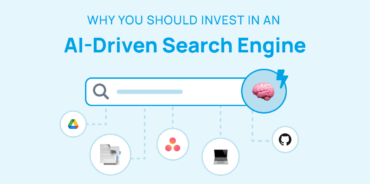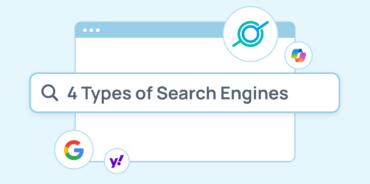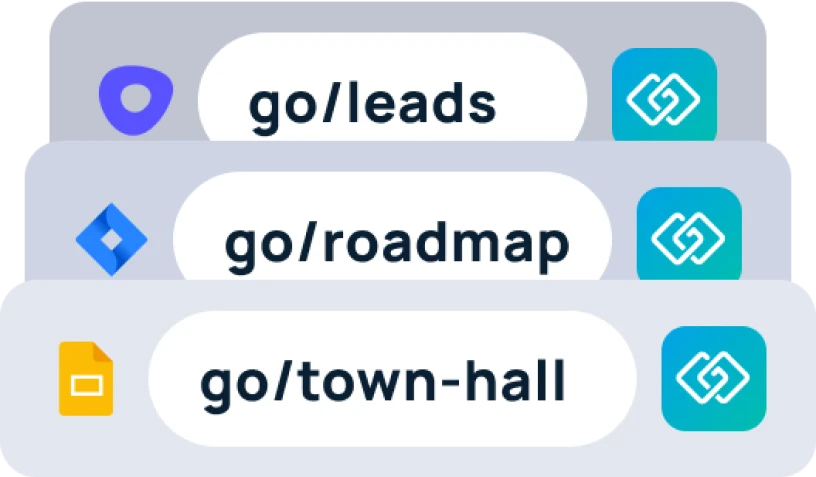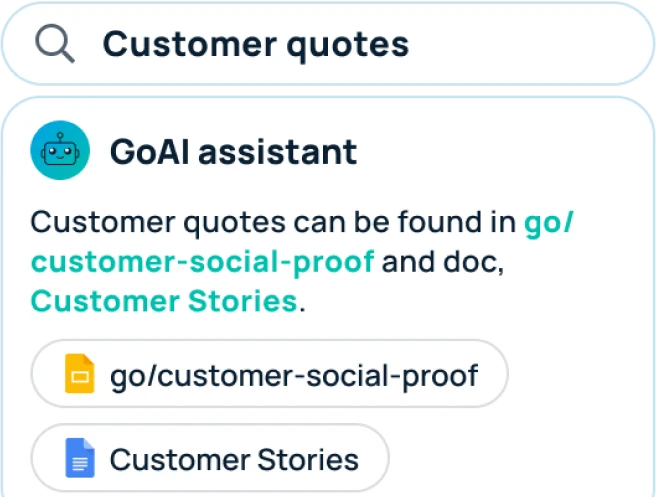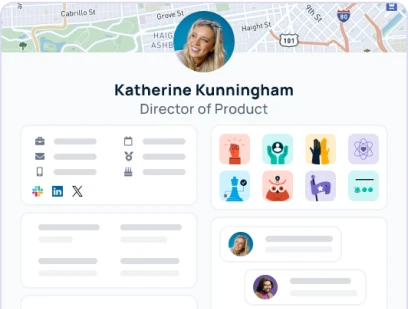Picture a library. Let’s say it has twenty books, one librarian, and three patrons. In that situation, everyone would get the information they need in no time.
But let’s say the library has tens of thousands of books, no head librarian, and over a hundred patrons – and they’re all simultaneously looking for help.
That’s the difference between knowledge management for a small business and an enterprise company. Because enterprise companies have so many people, departments, and platforms, they need unique solutions to connect employees to their vast array of resources.
That’s where enterprise search comes in. This important topic merits a deep dive, which is why we’ve created a three-part guide on enterprise search tools. In Part 1, we’ll cover basic definitions, how search as a service works, and why it’s so useful for enterprise companies.
Be sure to check out Part 2 on the benefits of AI-powered enterprise search, and Part 3 on choosing the best enterprise search software.

What is enterprise search as a service?
You’re probably pretty familiar with software as a service (SaaS). People use cloud-based solutions for everything from email to content management to video streaming.
Search as a service is a specific type of SaaS product. Think of it as an internal search engine; it connects to all your company’s data and lets internal teams search and access that content. The software-as-a-service model means it’s built, managed, and improved by a software company – so there’s no heavy lifting on your end.
It’s important to clarify: enterprise search is not site search. Whereas enterprise search connects employees to internal company information, site search focuses on external users’ website search experience.
If you’re budget-conscious and hesitant to add one more SaaS product, learn how you can use SaaS spend management software to optimize your tech stack.

How does enterprise search as a service work?
Without getting too technical, let’s take a look at how it works. Enterprise search combs through large amounts of internal data – apps, drives, files, tasks, people data, and other sources of knowledge. This relies on data indexing and vector search, which is distinct from federated search.
Federated search runs separate searches on each data source and presents combined results to the user. Unlike enterprise search, it doesn’t create a unified data index – instead, federated search relies on the existing indexes of the individual data sources, which can limit its functionality.

What is data indexing?
Data indexing is like a library card catalog. The enterprise search platform crawls all connected internal information sources and creates an index, or navigational guide, that’s frequently updated. This improves the user experience, since the pre-made index makes information retrieval lightning-fast.
What is vector search?
Vector search adds machine learning to the data index. It assigns a numerical value, or “vector embedding,” to all indexed data – whether that’s text, image, video, etc. The search platform then converts users’ queries into vectors and searches for relevant results based on quantified proximity within the vector database.
Basically, where humans perceive semantic similarity between data, the search platform perceives numerical similarity between vectors. This powers more relevant results and enables semantic search, which we’ll discuss more in Part 2 of the guide.

The result? Enterprise search reduces the amount of time and effort it takes employees to find information. This yields higher productivity, lower frustration, and overall better work. For related tips, check out this article on enterprise apps that boost productivity.
Why is search as a service a game-changer for enterprise companies?
Today’s users expect internal search to operate like a powerful external search engine. But creating Google-style search functionality for internal information isn’t easy. It requires significant effort and coding expertise to build, which is why SaaS options are so popular.
Search as a service provides an out-of-the-box solution for enterprise companies. When you invest in a fully formed product, you save time and personnel resources at every stage – from building to implementing to maintaining the search platform.
Powerful results with minimal effort is a recipe for enterprise success. With search as a service, your company will reap the benefits of knowledge management.
Consider these numbers: knowledge management is one of the top three issues influencing company success, but only 9% of orgs feel like they can address it. And it’s worth addressing – employees waste over 3 hours per day searching for information. That’s a lot of lost productivity.

These use cases show how enterprise search boosts information access and efficiency:
- Prateek, a new HR hire, wants to learn more about the company. He types “our core values” into the search box and finds a document with the company’s mission statement and core business values.
- Kayla, an SDR, is pursuing an opportunity with Nick Nguyen, an IT manager. She types “sales resources for IT” into the search bar to surface marketing one pagers and case studies for that persona. Or, with search queries like “nick nguyen” or “nguyen deal,” she navigates to the CRM page for that client.
Search as a Service FAQ
How does the implementation of enterprise search as a service impact data security and privacy, particularly in enterprises handling sensitive information and complying with regulations like GDPR or HIPAA?
The implementation of enterprise search as a service can significantly impact data security and privacy within enterprises, especially those handling sensitive information. Concerns regarding data security and privacy are essential considerations, particularly with regulations like GDPR (General Data Protection Regulation) or HIPAA (Health Insurance Portability and Accountability Act) governing the protection of personal and sensitive data. Enterprises must ensure that the search platform complies with relevant regulations and standards, implementing robust security measures such as encryption, access controls, and data anonymization to safeguard sensitive information. Additionally, data governance policies and procedures are vital for managing access permissions, monitoring data usage, and addressing potential security risks effectively.
Are there any limitations or challenges associated with the scalability of enterprise search as a service, especially for large enterprises with vast amounts of data and complex organizational structures?
Scalability considerations are crucial for enterprises deploying search as a service, especially for those with vast amounts of data and complex organizational structures. While enterprise search platforms are designed to handle large volumes of data and accommodate organizational growth, scalability challenges may arise due to factors such as data fragmentation, resource constraints, or architectural limitations. Enterprises must evaluate the scalability capabilities of the chosen search solution, considering factors such as indexing performance, query throughput, and system resource utilization. Scalability testing and capacity planning are essential to ensure that the search platform can effectively scale to meet the evolving needs of the enterprise, accommodating increases in data volume, user concurrency, and system demand over time.
Provide insights into potential user adoption challenges or strategies for maximizing user engagement with the search platform within the organization
User adoption and engagement are critical factors for the success of enterprise search initiatives. While the article highlights the benefits of enterprise search as a service in improving productivity and information access, it’s essential to address potential user adoption challenges and strategies for maximizing user engagement with the search platform. Enterprises should focus on usability, intuitive user interfaces, and personalized experiences to enhance user satisfaction and encourage adoption. Training programs, user support resources, and communication strategies can help educate employees about the benefits of the search platform and promote active use. Additionally, ongoing feedback mechanisms, user surveys, and analytics can provide insights into user behavior and preferences, enabling continuous improvement and refinement of the search experience to better meet the needs of the enterprise workforce.
The future of enterprise search
The future of tech involves artificial intelligence. So it’s no surprise that AI provides a better way to search and manage system-wide information. To learn about the 7 strategic benefits of AI-powered enterprise search, read Part 2 of our guide.
One product built for that future? GoSearch. Schedule a demo to learn how this AI-enhanced tool empowers knowledge discovery, data access, and company-wide transparency.


